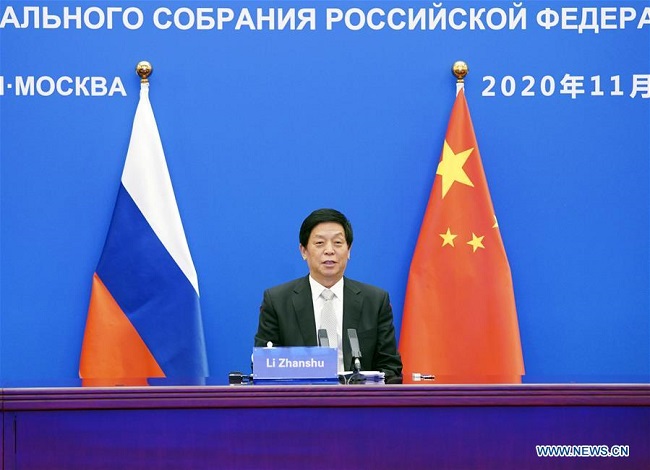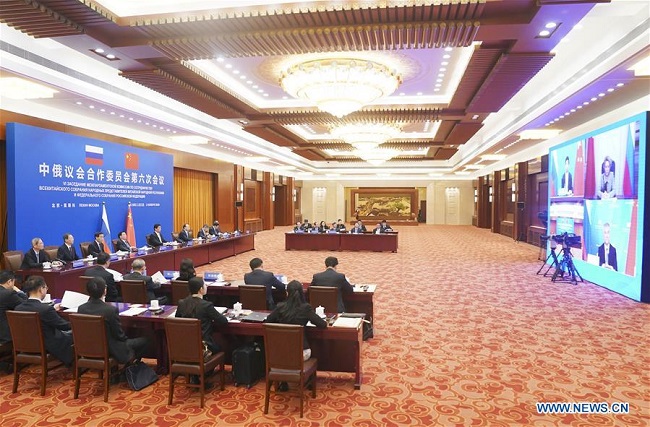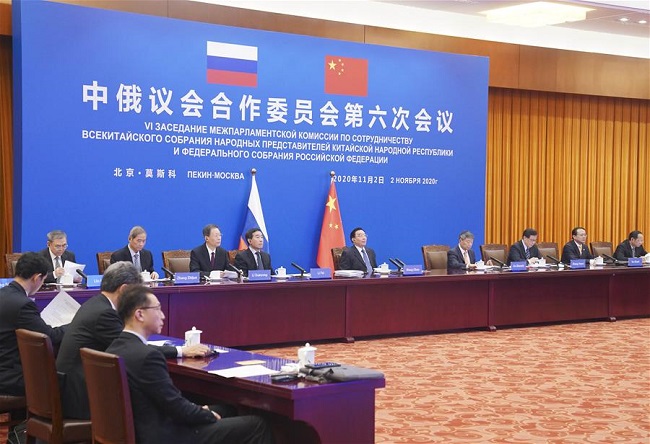China's top lawmaker offers suggestions to boost China-Russia legislative ties
Li Zhanshu, chairman of the National People's Congress (NPC) Standing Committee, put forward four suggestions on Monday aimed at boosting cooperation between the legislatures of China and Russia.
Li made the remarks in a speech at the opening ceremony of the sixth meeting of the China-Russia committee for parliamentary cooperation, which he attended via video link from Beijing.
He said that China-Russia strategic coordination had been tested by the COVID-19 pandemic, an event that was unprecedented in the past century, and that the friendship between the two peoples had been consolidated as a result.
The two countries helped each other and fought against the pandemic together, a fact that fully reflected the high quality and unique character of their ties, and made important contributions to promoting the building of a community with a shared future for humanity.
Li noted that the China-Russia committee for parliamentary cooperation is an important platform for implementing the consensus of the two heads of state, and has played an important role in optimizing the legal environment for bilateral cooperation and consolidating the public-opinion foundation of bilateral ties.
"The NPC is willing to work with the Russian Federal Council and the State Duma to push forward the China-Russia comprehensive strategic partnership of coordination for a new era, making due contributions in achieving the respective development and revitalization goals, dealing with risks and challenges together, jointly safeguarding world peace, and promoting the building of a community with a shared future for humanity," Li said.
On strengthening cooperation between the two legislative bodies, Li's first suggestion was that, in their exchanges and cooperation, the two legislative bodies should give top priority to the implementation of consensus reached by the two heads of state.
He called on the two legislative bodies to promote the synergy between the Belt and Road Initiative and the Eurasian Economic Union and push for cooperation in politics, economy and trade, people-to-people exchanges, local government, technology and the environment, so as to provide legal guarantees for bilateral agreements and cooperation projects of the two sides.
"Second is the promotion of bilateral and international cooperation to fight the epidemic," said Li, calling on the two sides to support the sharing of experience and information between the two governments, medical institutions, research departments and companies. He said this also includes taking the China-Russia Year of Scientific and Technological Innovation as an opportunity to enhance exchanges of experience on legislation in areas such as epidemic prevention and control as well as public health, while jointly supporting the World Health Organization and promoting the building a community of health for all.
Li's third suggestion was to enhance exchanges of experience on enhancing the rule of law in foreign and international affairs, jointly addressing the impact of unilateralism, protectionism and bullying behaviors on international relations and the global order, while safeguarding national sovereignty, security and development interests.
The fourth suggestion was to closely coordinate on international and regional affairs, firmly safeguard the UN-centered international system and the international order based on international law, and firmly defend the UN's central role in international affairs. Li called on the two sides to enhance cooperation under the framework of the Shanghai Cooperation Organization and BRICS, and safeguard international and regional security and stability, while reforming and perfecting the global governance system from the angle of legislative bodies.
Li also gave a briefing on the fifth plenary session of the 19th Central Committee of the Communist Party of China.
Russian Federation Council Speaker Valentina Matviyenko and State Duma Speaker Vyacheslav Volodin also addressed the meeting.





